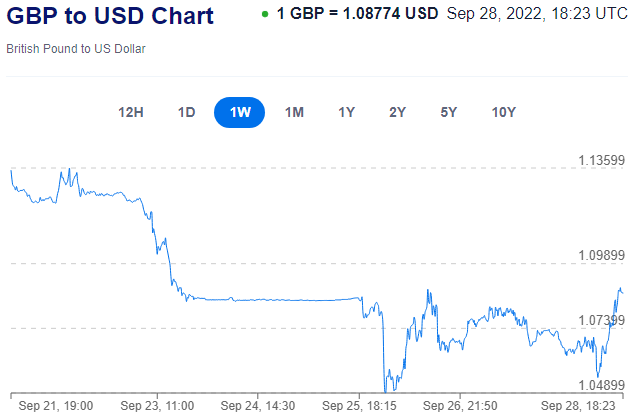After Chancellor Kwasi Kwarteng's shocking mini-budget announcement last week, worldwide markets (and the IMF) have clobbered Sterling and the Conservative government in general. Today the Bank of England intervened in bond markets to try undoing the worst damage:
The Bank will start buying government bonds at an "urgent pace" to help restore "orderly market conditions".
So called Liability Driven Investment funds - which support defined benefit pensions schemes - were facing a collapse in the value of the bonds they hold, which in turn could have forced them to rush to sell other assets, sparking yet more market panic.
The Bank has already said it will "not hesitate" to hike interest rates to try and protect the pound and try and stem surging prices. Some economists have predicted the Bank of England will raise the interest rate from the current 2.25% to 5.8% by next spring.
Despite the Bank's action, the pound continued to fall with some analysts warning it could even reach parity with the dollar.
"What today shows us, is that the market doesn't see this as a problem that just the Bank of England can clean up," said Jane Foley, a currency strategist at Rabobank. "This is just firefighting".
Economist Tony Yates, formerly of the Bank, believes the markets expect a reversal to the Tories' new policy, either as a volte-face soon or at the next election:
The combination of falling sterling and rising rates is particularly damning. Normally a country embarking on a monetary-policy contraction to combat an inflationary surge—imparted by a fiscal loosening—might be expected to see a rise in its exchange rate. But the government’s move has shaken markets’ faith in its fiscal competence and its grasp of macroeconomic realities. That loss of confidence produced the exchange-rate fall.
Mr Kwarteng’s delusions will come to an end. The worst return to reality would see Britain slide into a full-blown financial crisis. In this regard the fall in sterling is less important than the rise in the cost of government finances. That is partly because investors are demanding a premium: they expect to compensate themselves for the upheavals of recent days and the uncertainty they have introduced. (The economists Paul Krugman and Dario Perkins have called this a “moron risk premium”.) In a doomsday scenario this premium generates a self-fulfilling vicious cycle. It raises spending (on interest payments on existing government debt) and lowers revenues (a dearth of confidence will lead to less economic activity). This will raise the “moron premium” further, worsening the funding gap. And so on.
Ironically the fiscal plans of a prospective left-wing government are providing the confidence anchor for the right-wing government it is expected to defeat in the next election. And the more this is expected to happen, and the sterner and clearer Labour’s plans become, the less awful the crisis will be in the meantime. The stupidity of Mr Kwarteng’s policy and its unpopularity are helping to limit the damage done by it. Markets believe that things won’t carry on as they are indefinitely.
Of particular concern, most mortgages in the UK have floating rates, unlike here in the US where fixed rates are most common. So the rising interest rates and declining pound will start hitting mortgage borrowers hard, just when gas prices blow up later this autumn.
I only wish I had a few extra bucks right now for a trip to the Ancestral Homeland. Given the current Tory resistance to change in the face of direct evidence, though, I suspect the exchange rate will remain pretty favorable to Americans through the winter.
